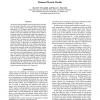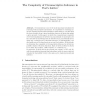99 search results - page 14 / 20 » From complete to incomplete information and back |
AAAI
2007
13 years 9 months ago
2007
Agents must form and update mental models about each other in a wide range of domains: team coordination, plan recognition, social simulation, user modeling, games of incomplete i...
CSCW
2004
ACM
13 years 6 months ago
2004
ACM
Abstract. In order to support co-located collaboration, many researchers are now investigating how to effectively augment tabletops with electronic displays. As far back as 1988, o...
ISRR
2005
Springer
14 years 6 days ago
2005
Springer
Haptic rendering commonly implements virtual springs using DC motors with current amplifiers and encoder-based position feedback. In these schemes, quantization, discretization, ...
ICVS
2009
Springer
14 years 1 months ago
2009
Springer
Traditionally computer vision and pattern recognition algorithms are evaluated by measuring differences between final interpretations and ground truth. These black-box evaluations ...
LPNMR
2009
Springer
14 years 1 months ago
2009
Springer
Circumscription is one of the most important formalisms for reasoning with incomplete information. It is equivalent to reasoning under the extended closed world assumption, which a...


